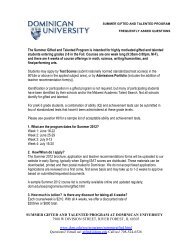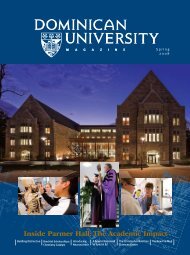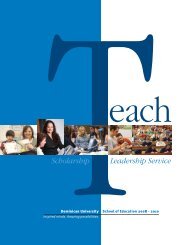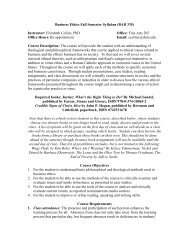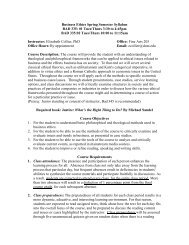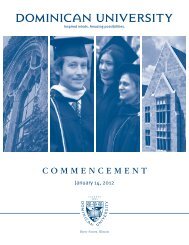6 2 - Dominican University
6 2 - Dominican University
6 2 - Dominican University
You also want an ePaper? Increase the reach of your titles
YUMPU automatically turns print PDFs into web optimized ePapers that Google loves.
In its first year, the <strong>Dominican</strong> <strong>University</strong> Kiva team,<br />
including members (from left) Tony Crement, PhD,<br />
Justyna Kuczaj, Lowell Morrison MSCIS ’10, Van Tang<br />
MSA ’10, and Jorge Mota Andrade, provided more<br />
than $13,900 in loans, putting the team on par with<br />
such top lending universities as Harvard, Yale,<br />
Northwestern and the <strong>University</strong> of Chicago.<br />
PHOTO CREDIT<br />
John Briggs<br />
Eradicating Poverty<br />
Is No “Impossible Dream”<br />
By: Anthony Crement, PhD<br />
Half of the world’s population lives on $2 a day.<br />
In 2000, the United Nations identified cutting world poverty in half by 2015 as one<br />
of its millennial goals. The fact that the goal will not be met does not diminish the<br />
worthiness of the goal. There is no metaphysical reason for poverty. It is not preordained<br />
that there must be poor in the world. Sometimes I think that in our deep subconscious,<br />
we accept poverty as a given and do not fight aggressively to eliminate it.<br />
Kiva works because it attacks one of the core problems creating poverty – lack of credit.<br />
In his groundbreaking book Creating A World Without Poverty, Muhammad Yunus<br />
succinctly and eloquently defines the problem as follows: “...if you spend enough time<br />
living among the poor, you discover that their poverty arises from the fact that they<br />
cannot retain the genuine results for their labor. And the reason for this is clear; they<br />
have no control over capital.”<br />
Most poor people are not poor because they choose to be. Most are poor not because<br />
they lack the desire, skill or initiative to earn a better living. They are poor in no small part<br />
because, without credit, they can only earn a living by their physical toil and sweat.<br />
The lack of credit limits the poor’s ability to be more productive. For the poor food<br />
producer in Kenya, it is the difference between grinding corn by hand rather than<br />
mechanically, thus producing a small percentage of what might be produced with the<br />
proper tools. The lack of credit makes the difference for the woman in Cambodia raising<br />
one milk-producing goat rather than two or three in order to better support her family.<br />
The lack of credit for the poor also has many extended effects. Might a spouse of a<br />
laborer in Mexico need to stay in the family business rather than seek possibly better<br />
wages elsewhere? Would the children of a farmer in Peru be compelled to help on the<br />
family farm rather than go to school?<br />
A loan made through Kiva is not just paying for a corn grinder or a second or third goat.<br />
A loan through Kiva provides hope for a better life. Kiva affords people the opportunity<br />
to use their skills to reach self-sufficiency. Kiva loans provide opportunities for<br />
entrepreneurs, not handouts.<br />
To date in its relatively short history, Kiva has funded 362,800 entrepreneurs in 199<br />
countries. If we were to assume five family members for each entrepreneur, that means<br />
that more than 1.8 million people are at the very least closer to escaping the ravages of<br />
poverty. It means that somewhere a mother might be able to sleep tonight without knowing<br />
that her children are going to bed hungry. It means a man or woman might escape the<br />
pain of seeing a loved one not getting medical attention because it cannot be afforded.<br />
This is why Kiva is so important to me. Kiva allows me in some small way to join the effort<br />
to do away with poverty. If believing that we can eliminate poverty makes me a fool,<br />
it is a title I gladly accept.<br />
Tony Crement, PhD, is an adjunct assistant professor of business ethics<br />
in the Brennan School of Business.<br />
Fall 2010 <strong>Dominican</strong> <strong>University</strong> Magazine



